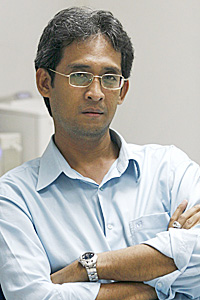
A recent report about the low proficiency in English of Thai students came as no surprise to many. What this tells us is that we cannot not give up, but must try harder.
In the latest English Proficiency Index conducted by Education First, a global language school operator, Thailand is ranked 53rd among 80 non-native English speaking countries and territories. Despite improving on last year's ranking, which saw Thailand languishing in 56th place (47.21) out of 72 countries, the country is still classified as "low proficiency" in the latest survey.
Among Asian countries, Singapore was top in 5th place, followed by Malaysia, ranked at 13th, then the Philippines in 15th; India, 27th; Hong Kong, 29th; South Korea, 30th; Vietnam, 34th; China, 36th; Japan, 37th; and Indonesia, 39th.

Soonruth Bunyamanee is Deputy Editor, Bangkok Post.
The EF English Proficiency Index has only confirmed national test results released earlier this year. The latest Ordinary National Educational Test (O-Net) showed Thai students, both Matthayom 6 (Grade 12) and Matthayom 3 (Grade 9), failing in English with average scores of 27.76% for Matthayom 6 and 31.80% for Matthayom 3.
In fact, English is just one of many subjects that Thai students scored poorly in.
The results showed less than 50% of Matthayom 6 students passed four -- science, maths, social studies and English -- out of five subjects. The only one passed by more than 50% was Thai language. On average, Matthayom 3 students failed all the five subjects.
Many excuses have been given for the poor English skills of Thai students and the general public.
One familiar-yet-ridiculous reason for Thai people's poor English skills that I have often heard is that, unlike several other countries, Thailand was never colonised by an English-speaking nation, in particular, by Britain.
It's true that some former colonies of the British have superior English skills but that does not mean that countries like Thailand that have never been colonised must always be English deficient.
Look at Vietnam. It's a former colony of France, but the country performs well in the EF ranking, as well as other international tests like the Programme for International Student Assessment (Pisa) which showed Thai students falling to 54th place while Vietnamese students' scores improved significantly to 8th.
Thai people can be proud of their history but that should not be an excuse for our students' poor proficiency in English, the world's lingua franca.
In my view, parents are part of the problem and hinder the progress of Thai students. Many parents complain when their children poorly perform in core subjects like maths or science, yet they are far less vociferous when their offspring fail an English test, passing it off with the mai pen rai attitude, as "English is not our ancestors' language".
Students themselves are also part of the problem.
Recently, I met a group of English-major students from a provincial university. A glance through their study backgrounds showed me several of them possessed good records in English reading and writing. Yet, after I finished my introduction in English and opened the floor for discussion, none asked any questions or spoke up.
Their teacher, who is a foreigner, admitted that his students' lack proficiency in speaking and listening even though several perform well in reading and writing.
In fact, such problems are not exclusive to this class. Most students are shy and try to avoid speaking in English for fear of making mistakes.
All of us learn our native language through listening and speaking before learning to read and write, but for English, it's the other way around. Students are taught to read and write first while listening and speaking comes later. In fact, most students take intensive listening and speaking courses only when they enter university.
Experts have cited several core problems behind the poor English proficiency of Thai students, including low proficiency and insufficiency of teachers, students' lack of enthusiasm and attention, and a poorly designed curriculum.
Currently, numerous schools, including those in the provinces, employ foreign teachers but, according to experts, many of them lack teaching skills.
Some experts suggest learning by throwing oneself in at the deep end to be an effective way. I agree. These days, everybody knows Jack Ma. He is an idol to many Thai people, particularly youngsters, with his success as an entrepreneur in the field of disruptive technologies.
In fact, Jack Ma should be a model for Thai people in learning English.
Coming from a poor family that spoke very little English, he wanted to learn the language and did not passively wait for an opportunity to approach him. In his early teenage years when China was just opening up to the world, he often approached foreign tourists and offered to be their tour guide as a way to improve his English.
He later chose to study English teaching. In 1995, at the age of 29, he took a trip to the US which forever changed his life. There, he saw how the Yahoo portal connected internet users, igniting his idea to create an online company in China.
His story should be used to inspire the young to learn English and applied as best practice for English instructors to teach their students.
As many as 35 million foreign tourists, almost half the Thai population, are expected to visit the country this year, and Thai students should be encouraged to use this opportunity to improve their English conversational skills like Jack Ma did.
The formation of the Asean Community and the rise in global connectivity and disruptive technologies have become a big challenge for Thailand. They will increase competition among businesses, and open the gates for a greater level of skills and mobility among the region's workforce.
But we are still behind our neighbours in English proficiency.
The economic gap may deprive some students of the chance to improve their English skills in class. But nobody is stopping them from thinking "outside of the box" and taking a more "disruptive" approach.
